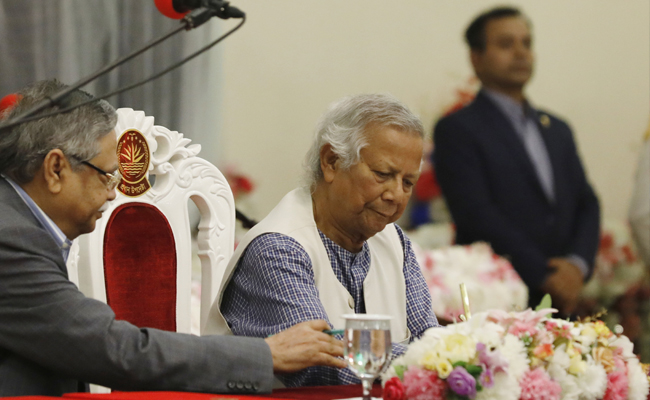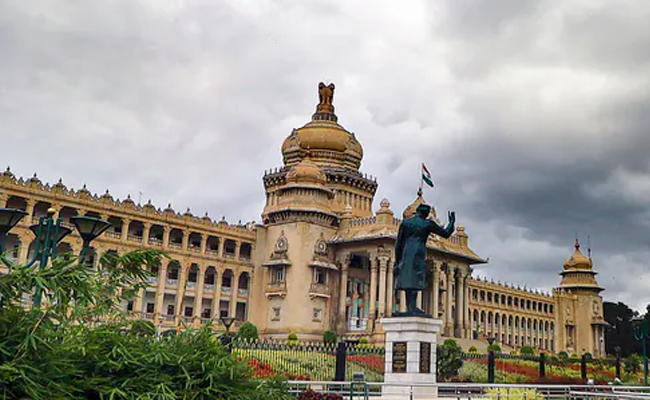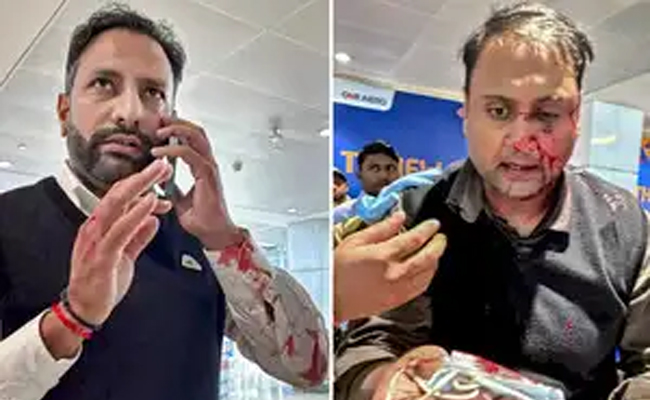Dhaka (PTI): People in Bangladesh have welcomed the new interim government led by Nobel laureate Muhammad Yunus, hoping it would restore order, end repression and hold a fair election to facilitate a democratic transition of power.
Yunus, 84, on Thursday took oath as the head of an interim government, replacing Sheikh Hasina who abruptly resigned and fled to India leaving the country in turmoil following deadly protests against her government over a controversial quota system in jobs.
He was sworn in as the chief advisor - a position equivalent to prime minister.
Women's rights activist Farida Akhtar, right-wing party Hefazat-e-Islam's deputy chief AFM Khalid Hossain, Grameen Telecom trustee Nurjahan Begum, freedom fighter Sharmeen Murshid, chairman of Chittagong Hill Tracts Development Board Supradip Chakma, Prof Bidhan Ranjan Roy and former foreign secretary Touhid Hossain are among the advisory council members.
Dhaka University Professor Emeritus Serajul Islam Choudhury said that one of the duties of the interim government would be to restore order, which has been disrupted over the last few days following the fall of Hasina.
"The other task is to ensure the safety of citizens," The Daily Star newspaper quoted Choudhury as saying after the oath-taking of the interim government.
The government would also need to eliminate all forms of oppression and the culture of fear prevailing across the country, he said.
However, the main responsibility of the government, he emphasised, would be to hold a fair and acceptable election to facilitate a democratic transition of power.
Eminent jurist Kamal Hossain said, "The change that has happened was welcomed by everyone. There has been an extraordinary turnout at the event. Everyone feels that change has come.
"We hope they [members of the advisory council] will be able to address the new crises. People will expect a meaningful change -- let this be that change," he said.
Barrister Sara Hossain said: "My main expectation from this government is that it will enable substantial reforms to institutions in Bangladesh and clear the path for truth-telling about what has happened not only in the immediate past or the past few weeks but even over the last 14 years and before that."
The students' anti-discrimination movement was for reforms and against repression and these should be the interim government's main themes, she told the newspaper. "What I perhaps am a bit troubled by is that, unlike previous years, there is no balance of political background and police. We obviously have no representation from (Hasina-led) Awami League. This absence of balance could cause a problem," she said,
Bangladesh has a secular Constitution, history and tradition, which has not denied any faith but encouraged pluralism, but the swearing-in today did not reflect that, she said, expressing hope that "it is not a sign of things to come."
The inclusion of students is of course unprecedented, she said, adding, "But I think it can only add energy to the whole process … I believe they can be a part of keeping the interim government in the right direction and keep it within the demands of the students and general people. We need to remember that even post-Liberation in 1971, we had many young leaders."
Samina Luthfa, associate professor at Dhaka University, said, "While I welcome the interim government, it is to be noted that many of them are from non-government organisations and require a specific kind of skill set. However, there is much work to be done to reform the nation, whether they have the skills for that remains a question. I think including the students [leaders of the anti-discrimination student movement] in the government brings hope."
Asked whether minority and women representation were enough, she said, "I believe those could be higher. Many other women and actors from religious minority backgrounds are skilled and have been supporting the movement, they too could have been included. More people from these segments of society could have ensured a higher possibility of a 'discrimination-free' country."
She added that since the Jamaat-e-Islami was banned, the Hefazat Ameer may have been included to balance out participation from all religious backgrounds.
"We are in an extraordinary situation and of course, we cannot expect everything to be perfect already, it will all take time.
"However, at this moment, the first thing the interim government must look after is the safety of all citizens, justice, the economy, and restoring law and order."
Let the Truth be known. If you read VB and like VB, please be a VB Supporter and Help us deliver the Truth to one and all.
Bengaluru: Government employees in Karnataka have urged the state government to scrap the New Pension Scheme (NPS) and bring back the Old Pension Scheme (OPS), The New Indian Express reported.
The demand was made by the Karnataka State Government Employees’ Association, whose leaders met senior IAS officer Uma Mahadevan on Monday and submitted a memorandum. The association asked the NPS Review Committee, headed by senior IAS officer Anjum Parvez, to recommend the reintroduction of OPS in the state.
Association president C.S. Shadakshari reportedly said the review committee has already visited Rajasthan, Himachal Pradesh, Andhra Pradesh and Telangana where NPS was revoked and OPS re-implemented. The committee is yet to submit its report, but has told the government it will do so soon.
ALSO READ: Udupi man loses Rs 55,000 in Facebook graphics card scam
Shadakshari allegedly said NPS has been in force in Karnataka since 2006. He pointed out that West Bengal never adopted the scheme, while Andhra Pradesh and Telangana replaced NPS with a contributory pension model.
States including Rajasthan, Chhattisgarh, Himachal Pradesh, Punjab and Jharkhand have already scrapped NPS through cabinet decisions or budget announcements.
“Under NPS, 10% of the employees’ basic salary and DA, and 14% contribution from the state is credited to the employees’ fund. It constitutes 24% of the total which is non-withdrawable. This is invested in the share market and the final amount depends on the ups and downs of the market,” TNIE quoted Shadakshar as saying.
As per the report, he said that by limiting its contribution to 14%, the government could save up to ₹1.87 lakh crore annually if all vacancies are filled, strengthening the case for bringing back the old pension system.





